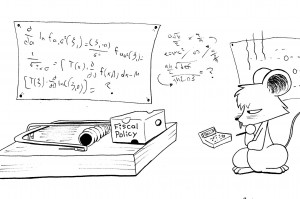Budget fights derail Congress’ agenda
The United States federal government has operated without a fiscal year budget for four years and 135 days. The last time both houses of the United States Congress agreed on a budget was April 29, 2009, when the Senate voted on party lines to give final approval to the budget for the 2010 fiscal year. To put it into perspective, that was when the USC class of 2014 was preparing for their high school junior prom.
In the interim, lawmakers have abandoned the domestic agenda to haggle about the best way to keep the government’s lights on. Not only is this an embarrassing reflection on our country to the rest of the world, but the divided nature of our House also means that budget woes are resolved at the expense of domestic policy goals such as immigration reform. The effect of such budget haggling is also international in nature: What will Congress do if it faces an international emergency and simultaneously must compromise to avert impending fiscal doom?
Unfortunately, it seems like America is about to find out.
The Congressional Budget Act of 1974 outlines the procedure for passing budget resolutions: They are crafted each spring (or they are supposed to be) to lay out specific plans for spending, taxing and other fiscal items in the coming fiscal year. They also lay out general plans for the next four years, such as deficit closing goals and long-term savings plans. If the budget resolutions in the Senate and the House are not uniform, a conference committee made up of members of both houses is tasked with ironing out the differences.
The abandonment of a budget is a disturbing trend. The impending government shutdown in 2011 was used by House Republicans as a political tool to force almost $40 billion in spending cuts, which virtually wiped out the stimulative effect of the previous year’s payroll tax cut. In July of 2012, Congress successfully punted the budget crisis forward with minimal effects. In January, President Barack Obama took time away from his vacation to sign via autopen a law to prevent the fiscal cliff, a deadly combination of automatic spending cuts and tax increases, from ravaging the U.S. economy. Those automatic spending cuts ($85 billion in total) took effect on March 1, and will be completed next month.
CNN reports that Oct. 1, 2013 is the new government shutdown date. This time, an international crisis in Syria threatens to derail negotiations on most pieces of legislation — meaning quick cooperation, a rarity on Capitol Hill, is a must. The first thing lawmakers must do is pass a continuing resolution by Oct. 1, which will be difficult if the GOP follows up on rumors that it will include a provision to repeal Obamacare. It would be the 41st time such a rider immediately killed a piece of legislation.
Even if that does pass, that does not get us out of the woods. Lawmakers must immediately raise the debt ceiling, or the limit on federal borrowing, which is currently set at $16.7 trillion. Otherwise, according to Treasury Secretary Jack Lew, the Treasury will no longer have the resources to keep the U.S. default at bay. The Treasury will immediately delay payments such as veterans’ benefits and social security — and it could all be because of a dysfunctional Congress in the midst of a debate about Syria.
The warped budget process must also be fixed in the context of reforming broader fiscal policy. Annual budgets will do no good if the government continues to run an annual deficit, and if that deficit adds to the mounting national debt. The fiscal cliff that nearly struck in January will look like an economic speed bump in comparison to the unsustainable trend of debt spending year after year. Perhaps Congress abandoned the budget process because the last annual fiscal plan allocated more than 25 percent of its expenditure to interest on the national debt, a dismal statistic publicized by the documentary I.O.U.S.A.
Congress should not stop debating Syrian intervention. But Congress must recognize national and foreign emergencies will need to be solved from time to time, and they cannot be solved effectively if Congress is stuck arguing about fiscal policy every three months. The dangerous fiscal path we have been on for the last four years sends the perception to the world that Congress is lazy and divided. Returning to the process of passing an annual budget will ensure Congress does not get caught with its pants down in the midst of an international crisis.
Nathaniel Haas is a sophomore majoring in economics and political science. His column “A House Divided” runs Thursdays.


The idea that there is a “budget fight” is laughable. Our income is “x” and our spending is “2x”; there is no budget; there is no fight.